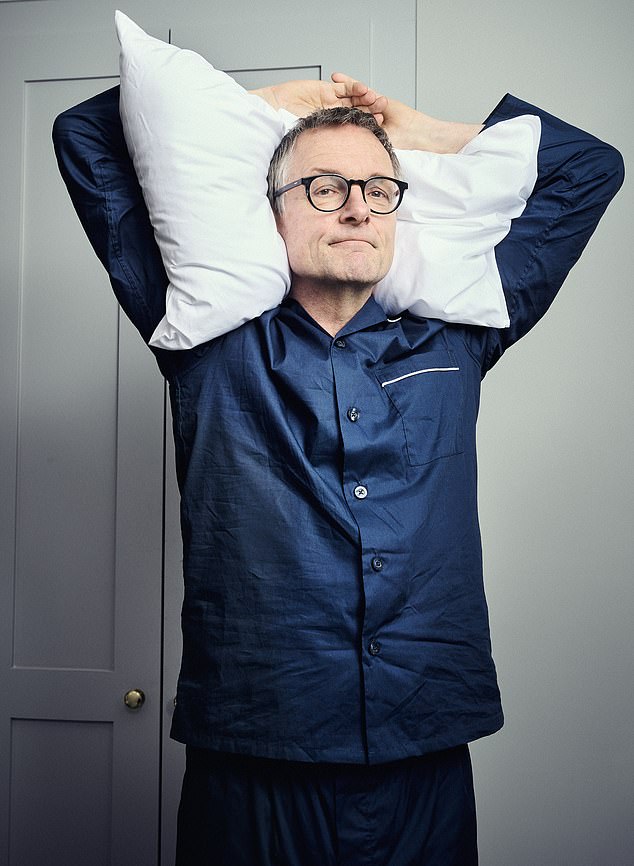I slept well as a young man, but by the time I reached my 40s, I began to show classic signs of insomnia. Most nights I would struggle to drop off – and then find myself waking up at three in the morning with thoughts rushing through my head.
And I am far from alone. More than half of people in the UK aren’t getting enough good quality sleep, and the impact on our mental and physical health is frightening – studies show poor sleep is a contributing factor in a host of life-limiting diseases. Even more worrying is the fact that our ability to sleep soundly diminishes with age.
My struggles with insomnia prompted me to explore the science of sleep and to take part in a number of ground-breaking sleep experiments, including a recent one, based at a leading sleep centre, where cutting-edge techniques were used to treat people with a range of chronic sleep disorders. Based on what I learnt, I’ve created a highly effective plan, which, over a period of four weeks, will create a secure foundation for good sleep for life.
I slept well as a young man, but by the time I reached my 40s, I began to show classic signs of insomnia, writes DR MICHAEL MOSLEY. Most nights I would struggle to drop off – and then find myself waking up at three in the morning with thoughts rushing through my head. Above: Dr Mosley and his wife Dr Clare Bailey, who is a GP
In yesterday’s paper, I showed how insomnia hits women hard, but today I shine the spotlight on men, and the ways in which poor sleep impacts the male physiology, and the many reasons why men tend to sleep less soundly as we get older.
Although we all know about the hormonal changes that occur in women at midlife, men are subject to hormonal upheavals too, and these can impact sleep. Levels of the stress hormone cortisol rise as we get older, which can lead to an increased chance of waking up in the night. It’s a vicious circle because a poor night’s sleep will, in turn, increase cortisol levels, making it harder to achieve good sleep.
Testosterone levels tend to drop as we get older and studies have found that lower testosterone leads to worsening sleep and greater problems with snoring and sleep apnoea (an extreme form of snoring that can interrupt breathing multiple times a night).
I confess I come from a long line of snorers, and for years I kept my wife Clare – and probably the neighbours – awake with my racket. Snoring can be caused by the anatomy of your mouth and sinuses, too much alcohol or allergies, but the main reason most people snore is because they are overweight. As we get older and fatter, our throat gets narrower, the muscles weaker and tissues floppier so that air vibrates as we breathe, producing that horrendous snoring noise.
Men are particularly prone to a snoring-related condition called sleep apnoea that causes you to stop breathing hundreds of times a night and is made much more likely if you are overweight or drink heavily. The condition affects one in four men (and one in ten women) and is extremely harmful if untreated – starving your brain and body of oxygen every night doubles your chances of sudden death and increases your risk of Alzheimer’s and dementia.
When I lost 20lb (9kg) in 2012, I also lost an inch of fat around my neck, and my snoring dramatically improved. So I can tell you with some authority that losing weight will help you sleep better.
What is more, the science shows that sleeping better makes it less likely that you will overeat, which makes losing inches around your waist and neck (the most common cause of snoring and sleep apnoea) that much easier.
As I explained in yesterday’s paper, one of the fundamental pillars of my four-week sleep plan, which works for both men and women, is switching to a Mediterranean diet, which delivers all the nutrients your body needs for good sleep and minimises the chemical additives that can hinder sleep.
But by the time you reach week two of the plan, I encourage you to incorporate another powerful dietary tool – time-restricted eating (TRE). This is the simplest and easiest form of fasting – you just increase the length of the normal overnight fast that happens when you sleep by either taking an early supper or a late breakfast.
This will help to strengthen the circadian rhythm that controls the sleep-wake cycle and improve the quality of your kip. It also boosts the release of human growth hormone that helps the body repair itself at night, meaning you are more likely to wake up refreshed and restored. Your goal should be to finish your evening meal at least three hours before you go to bed and avoid snacking in the meantime.

If your sleep has been fractured for some time you may have become reliant on sugary snacks to boost your energy levels during the day. But highly processed foods and fizzy drinks will set you on a blood-sugar rollercoaster that may be trapping you in a vicious cycle of sleeplessness.
GIVE UP THE BOOZE
A few drinks might help you to drop off at night, but heavy drinking inevitably leads to snoring and more fragmented sleep later on. If you drink every night and suffer from insomnia, I urge you to try giving up.
MORE EXERCISE WILL CUT THOSE TRIPS TO THE LOO
More than half of all men over the age of 45 find they have to get up in the night to visit the lavatory. Nocturia (waking up two or more times during the night to urinate) is usually caused by your prostate becoming enlarged with age and pressing down on the urethra (although it can also be a sign of diabetes, so if you’re concerned, do have a chat with your GP).
The good news is regular exercise can help. A study (2018 by Loyola University in Chicago) found that men who are physically active for one or more hours per week were 13 per cent less likely to report nocturia and 34 per cent less likely to report severe nocturia (waking up three or more times) than men who did no physical activity.
Exercise is thought to help by reducing body size, improving sleep, decreasing sympathetic nervous system activity (the branch of the nervous system that readies the body for a fight or flight response) and lowering levels of systemic inflammation.
SEX AT BEDTIME GIVES YOU THE ZZZZs FACTOR
No matter how tired you feel, don’t turn down the opportunity for intimacy – studies show having sex can improve the quality of your sleep. That’s because regular sex boosts levels of a hormone called oxytocin (known as the ‘love hormone’ because it helps human bonding) while reducing levels of stress hormones such as cortisol – and this soporific effect is even more powerful in men than women.
Switching to a Mediterranean diet, as recommended by this sleep plan, should be giving your sexual prowess a bit of a boost, too.
Studies have shown that foods such as oily fish, olive oil, garlic, onions, shallots, leeks and beetroot help to improve blood flow to the sexual organs and minimise the risk of impotence.
KEEP A DIARY TO LOG YOUR PROGRESS
My four-week plan for better sleep brings together the latest research to help you retrain your sleep ‘muscle’ and gradually build the good habits that guarantee top-quality slumber. If you have put in place my suggestions for week one – ensuring your bedroom is comfortable, dark and cosy, establishing set times for going to bed and waking up in the morning, enjoying a Mediterranean-style diet – your sleep quality should be starting to improve. Keep up with your sleep diary and regularly check your sleep-efficiency score. You can download a sleep diary template at fast-asleep.com. You should now be ready to add some extra measures to boost your sleep training.
THE FASTER WAY CAN BE THE BETTER WAY
To maximise your chances of a deep sleep, you can now try to incorporate a little TRE, which means extending the period when your body can rest without having to digest food. I recommend starting with a pattern of 12:12 which means not eating for 12 hours (for example overnight between 8pm and 8am). Try to maintain TRE five days a week. When this becomes easy, you can progress in Week Three of this plan to fasting for 14 hours (14:10) and ultimately to 16 hours (16:8) by Week Four.
Another rule is to not to eat within three hours of going to bed. This gives your body plenty of time to digest and ensures your core body temperature starts to fall as bedtime approaches to help trigger sleep.
ALWAYS PUT QUALITY ABOVE QUANTITY
One very effective strategy for improving sleep is a programme of sleep-restriction therapy. In my new book, I describe how to do this safely, but the idea is, for a few weeks, you continue to get up at the same time each morning but go to bed later in the evening.
By spending less time in bed you ensure that when you go to bed you are tired and sleep deeply.
Once you are not waking up for long periods during the night you can ‘reward’ yourself with an extra 20 minutes in bed (which means bringing your bedtime forward by 20 minutes). If, on the other hand, you are still finding it hard to drop off, or spending a lot of time in bed awake, I’m afraid you need to keep on with your later bedtime for at least another week. Sleep restriction works, but for some people it takes time.
IT’S TIME TO KEEP THE CLOCK OUT OF REACH
If you wake in the night, resist the temptation to check the clock. Calm your mind, don’t get annoyed, and try ‘progressive muscle relaxation’.
As you inhale, contract one muscle group (for example, make a fist with your right hand) for five seconds, then as you exhale release the tension in that muscle. As you do so, imagine those stressful feelings flowing out of your body. Relax, then progress around your body from your fingers to your toes, contracting and releasing one muscle group at a time. You should be asleep before you reach your toes.
DON’T TALK YOURSELF INTO STAYING AWAKE
Once you are halfway through the four-week plan, your sleep diary should be showing up improvements in the depth and quality of your sleep. It’s time to add a few extra layers to really consolidate your sleep muscle. To start with, make a pact with yourself to stop talking about sleep. If someone asks how the programme is going, say ‘great, thanks’ (even if you’re having a tricky day).
By channelling positive thoughts, you can dial down some of the stress and negativity you might have associated with sleep. Slow the negative spirals, and work towards thinking of yourself as ‘sometimes’ having trouble sleeping, rather than slipping into the self-fulfilling prophecy that can come with labelling yourself an ‘insomniac’.

Once you are halfway through the four-week plan, your sleep diary should be showing up improvements in the depth and quality of your sleep
WHY BEANS MEANS A GOOD NIGHT’S KIP
Beans, peas and lentils aren’t everyone’s favourites but they are a highly nutritious form of vegetarian protein, extremely cheap, and they provide a form of soluble fibre that your ‘good’ gut microbiome loves to feast on. Well fed, these bacterial populations manufacture the feel-good hormone, serotonin, which plays a role in regulating appetite, digestion and significantly – sleep.
WALK THIS WAY FOR BEDTIME BLISS
As your sleep quality improves, your energy levels should be creeping back up. This means, if you haven’t already done so, it’s time to incorporate regular exercise into your daily routine – not just because exercise is very good for almost every aspect of your mental and physical health, but because it will improve your sleep as well. Resistance exercises (strength training) is particularly beneficial.
If you struggle to fall asleep at night, I strongly recommend getting into the habit of a morning walk.
This will expose you to bright light, which helps set your circadian rhythm, meaning you are more likely to feel sleepy at bedtime – and if you throw some strength training into the mix, better still.
DON’T STRESS – TAKE SOME DEEP BREATHS
If low-level stress and anxiety have been getting in the way of your sleep, try these deep breathing exercises, which have been shown to help reduce stress. Begin by taking a slow, deep inhale through the nose, allowing the air to really fill your lungs.
Put a hand on your belly – you should feel it inflate.
Hold it for a count of two, then breathe out slowly through your mouth. Your heart rate will slow and you will start to feel more relaxed.
Alternatively, try this: Breathe in deeply through your nose while mentally counting to four. Hold your breath to a count of two. Breathe out through your mouth to a count of four.
© Dr Michael Mosley, 2023 Adapted by Louise Atkinson from 4 Weeks To Better Sleep by Dr Michael Mosley (Short Books, £14.99).


